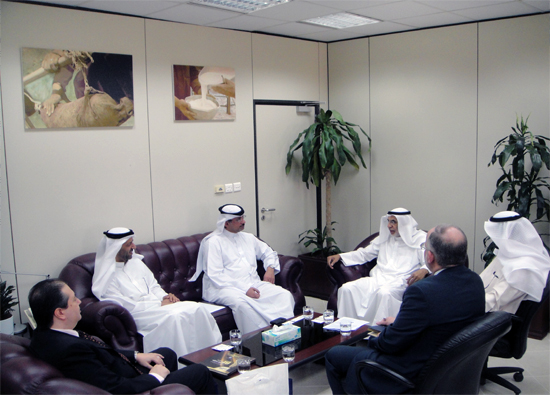A delegation of Sheikh Hamdan Bin Rashid Al Maktoum Award for Medical Sciences (SHAMS) has returned back to Dubai after conducting a series of discussions with officials at Kuwait University on strengthening ways of cooperation between the two institutions by launching a genomic mapping project for the Emirati population similar to the one initiated in Kuwait. The project comes as an initial phase in the ambitious project launched by the the award’s Centre for Arab Genomic Studies (CAGS) in 2007 to lay a detailed Arab genome map.
After the meeting, the delegation visited Kuwait University’s Central Laboratory for Research. The delegation included Mr. Abdullah Bin Souqat, Executive Director of SHAMS, Dr. Mahmoud Taleb Al Ali, Director of CAGS, and Dr. Ghazi Tadmouri, Assistant Director of CAGS.
At Kuwait University, the delegation was received by Prof. Hasan Abdel Aziz Al-Sanad, Vice President for Research, Prof. Haitham M. S. Lababidi and Prof. Najib Smaoui, Assistants to the Vice President for Research, and Dr. Obeid S. Al-Otaibi, Assistant to the Vice President for External Research.
Mr. Abdullah Bin Souqat, head of the delegation, said that the visit comes within the framework of instructions of HH Sheikh Hamdan Bin Rashid Al Maktoum, Deputy Ruler of Dubai, UAE Minister of Finance, President of Dubai Health Authority and Patron of the Award, and the Board of Trustees who approved the initiation of the project to map the Emirati genome and promote joint Arab collaborations in the fields of genetic disorders in Arab countries, their diagnosis, and the best practices to develop health care in the region.
Bin Souqat added that modern global health economies mainly depend on studying the characteristics of local genomes in order to develop modern diagnosis and treatment technologies.
“It is time for Arab countries to realize the importance of catching up with the tremendous development in that field, developing Arab scientific research and mapping the Arab Genome are the main tools to find the best treatment with lower cost”, Bin Souqat said.
He added that the success of either the Arab or Emirati genome projects requires exerting concerted efforts among Arab governments, organizations, and individuals in order to reach desired results.
Dr. Mahmoud Taleb Al Ali, Director of CAGS, added that mapping the Emirati Genome is of a highly importance, as it is expected to reveal the level of genetic variation in the population as a prerequisite for developing preventive plans for many genetic disorders, promoting proper diagnosis and treatment policies..
“Kuwait University’s Central Laboratory for Research is considered the best in the Eastern Mediterranean countries in terms of its equipments and staff. The first phase of the Emirati genome mapping project is scheduled to include the analysis of number of samples representing the UAE population. SHAMS is looking for the best Arab equipped laboratories in this regard”, Dr. Al–Ali said.
“CAGS has worked hard over the years to establish the necessary infrastructure to support the project to map the Arab Genome”, he added. He also said that a complete plan for the project is currently underway at CAGS to define the best ways to collect representative samples, taking into account the distribution of citizens in the Emirates.

